restoring the engine of everything
why putting ethical filters on what questions may be asked by science destroys not only ethics and science but society as well
human societies, civilizations, economies, and systems of association really just represent various structures for problem solving.
they can be bottoms up emergent structures, top down impositional/authoritarian structures, or (generally) some interwoven hybrid of the two; but in the end we’re always solving problems like survival, reproduction, production and allocation of resources, cohabitation with other humans, etc.
you can essentially boil the notion of an economy down to being a mechanism for producing and trading solutions to problems.
the same can be said for government, systems of ethics, or any other sort of mechanism for social interaction.
pretty much all issues, be they simple or complex, involve trade offs. if you do A, you cannot do B. if you would accomplish X, it has a cost of Y. this is the basis for all rational decision making, planning, and the process of pareto optimization by which groups seek greater welfare by engaging in mutually beneficial trades.
this is the engine of everything.
but the output of such an engine is only as good as its inputs. the well known computing maxim of GIGO (garbage in, garbage out) pertains. if you do not have sound data to feed into this process, it cannot produce sound results. rather, it will amplify the distortions in source material and lead away from productive avenues of inquiry and solution.
if you do not know what the facts are, you cannot discern the nature of problems, much less scope or solve them. and this is why source material matters so greatly. and this is why we are getting into such trouble.
science, be it physics or chemistry, economics or sociology, is supposed to be content neutral. it is not about setting policy. it is about determining the base facts as accurately as possible so that the possibilities and trade offs inherent in decisions and structures become visible and can be meaningfully assessed. we subvert or sidestep this ideal to our own great peril. when we place ideology (even if imbued with the best of moral or ethical intent) ahead of honest and accurate accounting of facts, we break the process of progress and of thought.
and this is why the rapidly emerging trend to “moralize science” is so profoundly pernicious.
this is stavroula kousta, the chief editor of the prestigious “nature: human behavior” journal. as can be seen, she does not believe in dispassionate gathering of facts or in the freedom to perform relevant research to find them. instead, she believes in a first pass screen of “ethical purity” that must be applied because, in essence, “if certain facts were known, some people might not like it.”
this starts to take us onto VERY dangerous ground.
she is far from the only journal editor engaging in such ideas and practice, but she has been one of the more vocal of late and so i’m putting her forward as an exemplar.
her paper HERE has generated quite a lot of spirited discussion and debate if you happen to run in such circles.
i encourage you to read it and judge its intent and impact for yourselves, but as most won’t, i’ll give you a quick precis:
“Yet, people can be harmed indirectly. For example, research may — inadvertently — stigmatize individuals or human groups. It may be discriminatory, racist, sexist, ableist or homophobic. It may provide justification for undermining the human rights of specific groups, simply because of their social characteristics.”
this is sort of the money shot. it’s basically saying “if we do research into X and X shows some difference between groups that casts someone in a negative light this might harm them or make them feel bad and therefore such research should not be performed or published.”
it’s a pretty stunning set of claims that carries within it not only the seeds of vast systems of censorship driven by imposed ideological purity, but also the stunning presumption of sound foreknowledge of second and third order effects therefrom and not only the entitlement but the obligation to make choices for everyone based upon it.
she is, in essence, saying “i know how gathering and reporting truth will affect all others and therefore i shall determine what truth may be known in order to bend such outcomes into accordance with my sense of equity and dignity.” these are high ideals, but they seem to fail even a perfunctory assessment of plausibility.
how could one possibly know such a things with any confidence?
certainly, science is silent on such topics.
there is just no way to aggregate good and ill objectively because welfare is always and everywhere subjective and notions of knowable “collective welfare” in any quantitative or even qualitative sense are just fictions created to justify the imposition of one set of personal preference by claiming it to be a general case. and this can never work. it places the whole process of the system in the improper order.
applied broadly, this turns the engine of everything into a garble of GIGO.
in a proper system, the process works like this:
science and inquiry generate data. data is used to assess possibilities for outcomes. those various outcomes can then be compared against one another to assess trade offs inherent in various choices. to this point, the process remains objective. we’re dealing in facts and relationships.
but once we start to make choices about which trade offs suit us best, the system becomes subjective.
is strawberry preferable to chocolate?
is the extra traffic downtown worth the enjoyment from a new stadium?
is research into genetic modification of humans a good idea?
should bathrooms be segregated by gender and if so, how?
these are all questions that lack objective answers and that require reference to the subjective preference functions of individuals and once you add subjectivity to a system, you cannot take it back out. every calculation from that point forward will be biased and only as good or as applicable as its assumptions.
any system of ethics that begins to make actual prescriptive determination about which of several outcomes is to be preferred as a trade off suffers the same issue and this goes double for ideas like ms kousta’s. implicit in her doctrine is a subjective choice: “we must value my professed conception of dignity over truth.”
and if we place that precept before “gathering and reporting objective facts” then we have rendered the entire system of science subjective. having done so, can we even really call it science anymore? i would argue that we cannot. we have replaced a system of open inquiry with a system of arbitrary and assumptive ideology.
and this has potential for vast and unpredictable 2nd, 3rd, and umpteenth order effects. there is simply no way to know what the downline costs of “not knowing things” or “not allowing truth to be spoken” will be, but it’s the death knell of science, the values of the enlightenment, and the basic ability to accurately weigh alternatives and make choices.
it even destroys the possibility of generating valid systems of ethics and morals because if one cannot know facts, how can one assess the effects that determine whether an act is good or bad? how can you make a choice about what constitutes “helping someone”? best i can tell, you cannot and this is a serious problem because, of course, the very first pass filter that we are being asked to apply before we are permitted to discern and publish data is one rooted in alleged ethical systems, the very thing we are no longer able to validly establish.
this makes the whole idea inherently self defeating.
this is not a means to promote objective ethics, it’s a tactic to insert subjective preference in an unassailable fashion that may not be questioned much as was done to turn the self-abnegating parlor game of post-modernism into weaponized doctrines such as critical race theory by adding non-interrogatable salients not subject to refutation or deconstruction.
it’s inherently dishonest and unprovable and it renders entire fields and areas of inquiry off limits. it’s the literal equivalent of pouring sugar into the gas tank of the engine of everything.
you will not be able to see problems or frame them, much less solve them.
and it’s already been going on for ages.
i recently started reading a book by harvard professor carole hooven called “T, the story of testosterone.” it’s interesting material, but what really jumped out was the first chapter which is basically a 25 page apologia for daring to research hormones and sex differences in humans and a desperate plea to not be canceled for it. this is de-rigeur in such fields. you basically have to spend the whole first part of your research disavowing the idea that your field should even be a field. she even went so far as to explain how she stopped doing fundamental research and switched just to teaching for fear of being ostracized and denied tenure for the crime of “finding and validating fundamental biological sex differences in humans.”
and if you think that’s bad, you should see what genetics and behavioral genetics are like…
and it has had real effects.
i recall (but cannot find, more’s the pity) what i believe was a NYT reporter or some such musing on twitter about how she did not understand how there could be so many types of dogs and how they could be bred for size or speed or intelligence because “i’ve studied human genetics and i know it does not work like that.”
the shadow of eugenics is long and unforgiving. atrocities of the 30’s have basically rendered this whole field verboten. to even talk about it requires the kinds of warnings and disclaimers that are normally associated with toxic chemicals.
to delineate differences in people, genetic breeding, selection, or alteration in humans is and out and out minefield. establishing or pointing out variances in race, gender, or nationality is severely suppressed in nearly all academic circles, especially in the US.
you simply cannot talk about it because of the deep atavistic terror that if we compare one group to another and find it wanting, we can start talking about “inferior races” and differential treatment or genocide.
few people favor such things, especially genocide, but this was not always so and there is real fear of going back.
this may well have good intent, but is the suppression of facts and inquiry the best way to do this or does it actually cause the matter to fester as that which is rendered “forbidden knowledge” becomes all the more alluring in a form of scientific streisand effect?
the “the world is a sphere” faction does not try to silence the flat earthers. they simply provide data.
but those who censor are never making their own case more persuasive. if you have the data on your side, then present it. more often than not, being told to shut up because such things may not be spoken of is more likely to convince one that one is right and we tend to identify what others fear or cannot counter by that which they will not allow to be spoken.
thus, such suppression undermines credibility. worse, it undermines functionality. you cannot identify the actual moving parts of the world and decide how to best act in light of them. you’re basing decisions on subjective ideological salients mistaken for objectivist foundations and data and this process becomes recursive as each new set of problems created by mis-identifying the last problem are now mis-identified in turn and further distorted through the same lens.
and that way lies not only madness but ruin:
you are well on your way to outright reality denial.
the ever accelerating disaster curve has begun and each iteration leaves you less and less possessed of the information required to extricate yourself from it. at a certain point, you’re a drowning swimmer grasping at ever more anchors and offering them up to others as water wings.
and that only ends one way…
i’m now going to deliberately pick a deeply provocative issue about which people fight savagely and that is broadly suppressed in the US despite there being quite of a lot of quite objective data on it: IQ and outcomes.
it’s not my intent to validate or invalidate these claims here (don’t summers me bro!) but it is my intent to put them forward as valid inquiry worth making if one is ever to understand the world and to lay out the sorts of issues that arise in the event that this field is broadly correct if we refuse to accept such “inconvenient truths” and persist in trying to solve problems using GIGO systems instead.
if this makes you angry or offended i ask not only your forbearance, but also your introspection. if you would be on the side of science and evidence, how can evidence be offensive? perhaps ask why you find it difficult engage with and weigh it dispassionately? that answer is important and if we would be rational, then we should all seek to know such things about ourselves.
(braces for impact)
here goes:
IQ, or, more broadly, G (generalized intelligence) really does correlate to all manner of positive outcomes. it’s also highly invariant over an individual’s lifetime, highly impacted by genetics, and distributed unevenly. the ashkenazi basically break the charts on IQ and despite being a tiny group, account for a stunning % of nobel prizes etc.
this makes the whole thing seem unfair and many, many people hate it. they will not allow it to be spoken and are keen to claim it’s “socialization” or “nurture, not nature.” or that “IQ is not a real measure of anything meaningful,” but the data sure seems to say otherwise. those sort of correlations (especially as the directionality of the effect is often quite clear) are not to be lightly ignored.
consider that much of this is could well be just assumptive wishful thinking to avoid engaging with unwanted facts and while it may make some groups feel better to not have real and durable differences in intelligence pointed out, it also means that (assuming such claims are true) accounting for and potentially remedying inequity of outcome (a popular vogue) has been running down a long line of potentially inapt alleys.
here’s some research that many people REALLY don’t like using the PISA standardized tests for math.
being brutally honest here, i find the evidence from this research deeply jarring. it examines various math questions that correspond to 6 levels of increasing difficulty and then assesses the performance of 15-16 year olds in answering them. by level 6, only 3% of students in the OECD are getting the right answer.
jeez, these must be really difficult questions. i was expecting something with differential calculus or obscure geometry.
instead, i got this:
apparently, 97% of OECD students could not answer this (or other questions of similar difficulty). this frankly flummoxed me. i have not checked the data, but the source is a solid one and this is a published analysis from PISA so i have no particular reason apart from my jaw being on the floor to doubt it.
i had no idea that that might be the world we are inhabiting. the numbers are even designed to be easily multiplied in round figures so you can do it in your head in a few seconds. i would have guessed that 2/3, not 2% of american sophomores could answer that.
apparently, i may have been way, way off.
now, presuming this is accurate, consider what it means for ideas like “you should not be learning X, you should be learning to code!”
is that even plausibly on the menu for people unable to solve that math problem? (and if we deny this reality, are we going to push a totally inapplicable solution on those it probably cannot help?)
see how the ethical filters keep you engaging in fantasy and not practicality? see how knowing that fact might dramatically change your ideas about how to handle retraining?
you should really take the time to read the article and examine the problems. level 1-3 are literally “can you read a table and pick out the relevant information?” and “can you do simple 3rd grade arithmetic?”
but then we get this:
there are whole strata of countries where even by level 3, you’ve washed out 80% of the population.
yowsa.
these are massive divergences and, if accurate, pose very real constraints on many economies.
if the economy is a mechanism for producing and trading solutions to problems then its potential is highly determined by the sorts of folks you have around to solve them.
that implies that things that are possible in a society where half of people can answer level 3 math problems might be very different from those that can be accomplished in a society where only 1 in 8 or 1 in 10 can.
it also implies that perhaps there is a reason that so much semiconductor manufacturing has accreted in taiwan, where 18% can answer level 6 and why it’s perhaps not going to be possible in indonesia where you’re at ~0% by level 5. you may simply lack a talent pool commensurate to the task.
and if this is largely genetic, you’re not going to change it with social policy and trying to do so is futile and bound to frustrate and waste resources.
is this true and proven as a theory?
i’m not sure. some argue it is. others are emphatic that it is not. we’re out on something of a limb here and extrapolating from salients, but it seems a credible hypothesis based on data and one with sufficient foundation to warrant more work and informed debate.
the argument that intelligence drives outcomes and may be mostly genetic, innate, and immutable is one many people find abhorrent, but they suppress it not because it’s false, but because they do not like the implications. tell someone you want to research “new nurture techniques to make kids smart” and you are lavished with cash and accolade. but claim it’s biological and you’re cast out. the truth may well be complex where 1/3 is genes, 1/3 environment, and 1/3 a sort of “messy middle” in which the two interact in complex fashion and that can be made to look like nature or nurture depending on which variables one holds constant in a study which is the perfect setup for endless academic war because both sides lay claim to 2/3 of effect.
but we’re never going to get to the bottom of it if one side is censored.
at the end of the day, we need objective facts, not curated perception or we’re going to have no idea where we’re going. if you want to apply ethics, the time to do it is later, not when gathering data or making accurate assessment of possibilities and trade offs.
consider:
perhaps the price of getting real data is “indonesians may feel bad or suffer stigma” but if we disallow such discussion and this turns out to be true, the price is “we’re going to keep implementing ever more ill conceived ideas about school and nurture and fad based IQ denial or training” that all amounts to pushing on a string. we’ll waste resources, frustrate people, and deepen delusion about the nature of reality and the possibility frontier of outcomes.
the engine of everything will get caught in infinite GIGO loops.
and then you’ll see things like this:
from another PAPER that is upsetting a lot of people
and you will assume that this is a social justice problem, a colonization problem, an unequal opportunity or resource problem, or any one of 100 answers that are not the “this is an unequal distribution of intelligence” issue about which we are not allowed to speak or publish.
and if the latter is, in fact, the correct answer, you’re going to not only be lost, but you’re going to propose all kinds of “solutions” that have misdiagnosed the problem and will be trying to fix the furnace by cleaning the sink drain.
nobody wins in such a scenario, least of all those being coddled and “helped” and telling the 5 foot tall neighborhood klutz to “just dunk it like lebron” is not particularly useful advice.
again, i have not vetted all the math or tried to replicate it, but i am familiar with the authors and they do good work and this certainly looks like grounds for discussion and “protecting feelings and avoiding stigma” seems like a dangerous preference to “let’s find out what’s really going on and use that to discern what is or is not possible, preferable, and ethical.”
and this, in the end, is the trump card for me.
if you do not have bedrock facts arrived at as dispassionately as possible because open inquiry has been proscribed, you do not have the truth all the other downstream systems of discernment need as anchoring.
you’re extrapolating from assumptive and probably inaccurate premises and no logic no matter how powerful can solve that GIGO issue.
you’re euclid trying to build a system of geometry from the idea that circles have 360 degrees but triangles have 100.
and that’s all going to fall down.
and that is why “ethics before science” is going to fall down too.
there is just no way to generate provably (or even reliably) valid structures from it.
it’s ideology, not inquiry and this creates a circular flow of ever more ideological forms of ethics derived from such principles which then flow back into further and ever more distorting proscriptions of scientific endeavor and discovery which then further taint ethics.
this is societal and intellectual bowl circling and the effects will grow ever worse and need to be defended by ever more areas of exploration being placed off limits.
and it’s why this trend must be resisted and reversed.
there is nothing down this road that you want to live through and choosing the risks of falsity over the risks of truth unmakes the age of reason and turns the engine of everything into a deeply pernicious policy salad generator.
it’s time to turn around.
and the sooner the better.






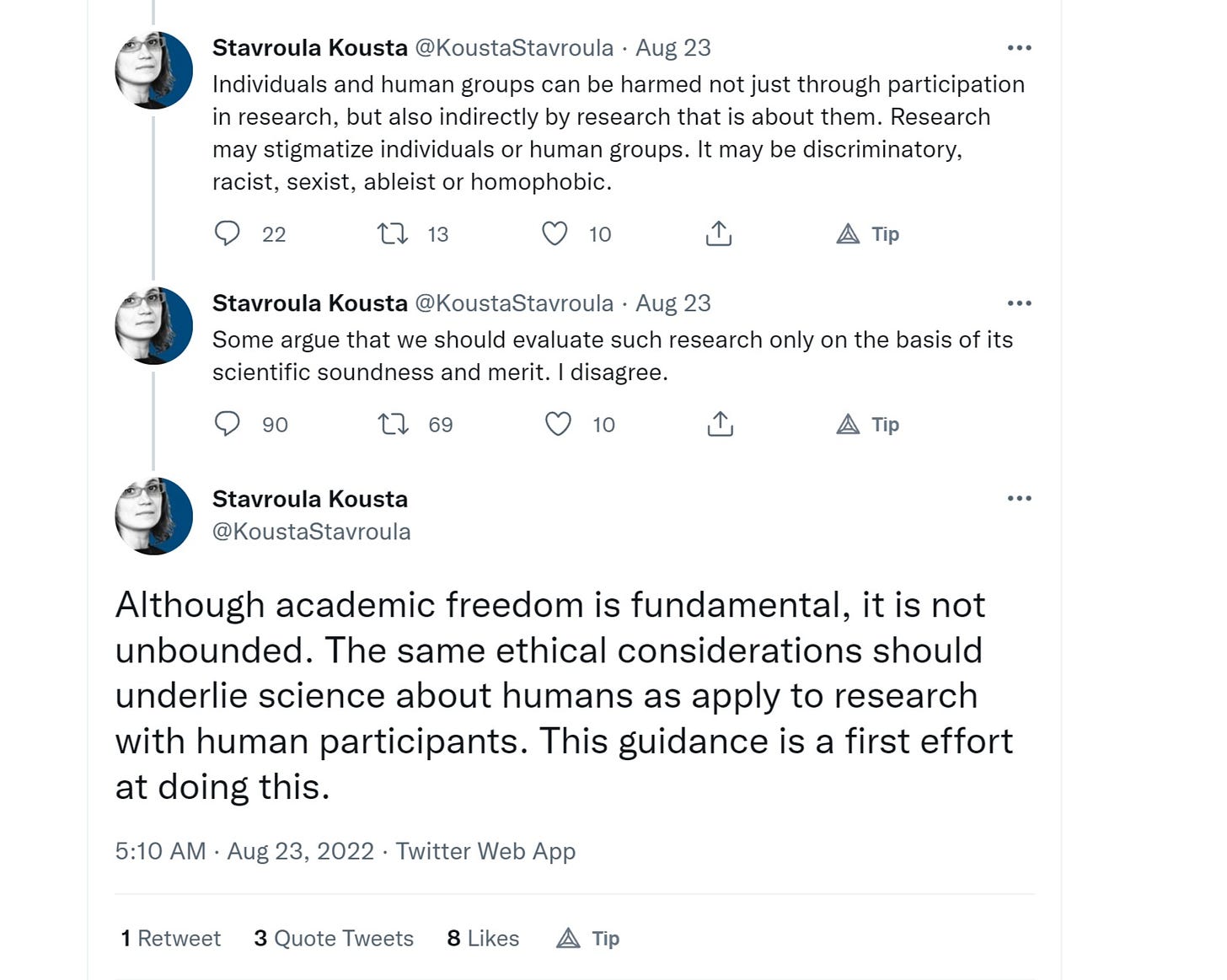

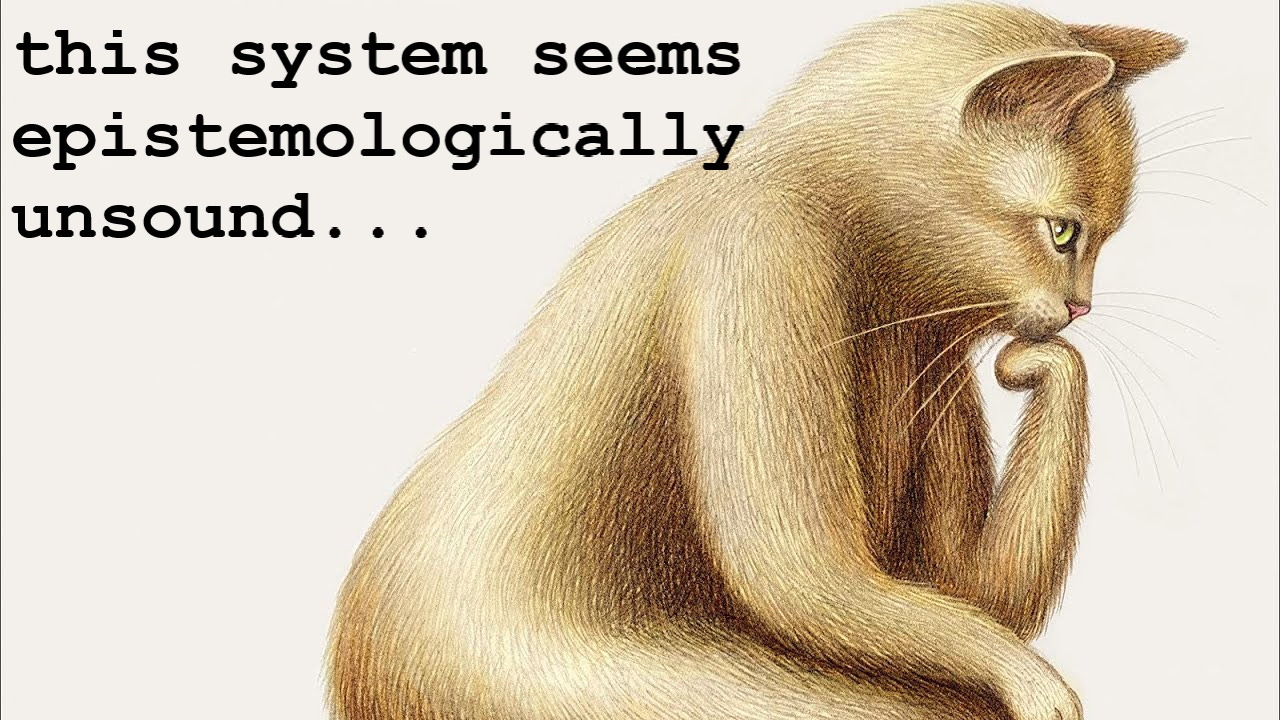
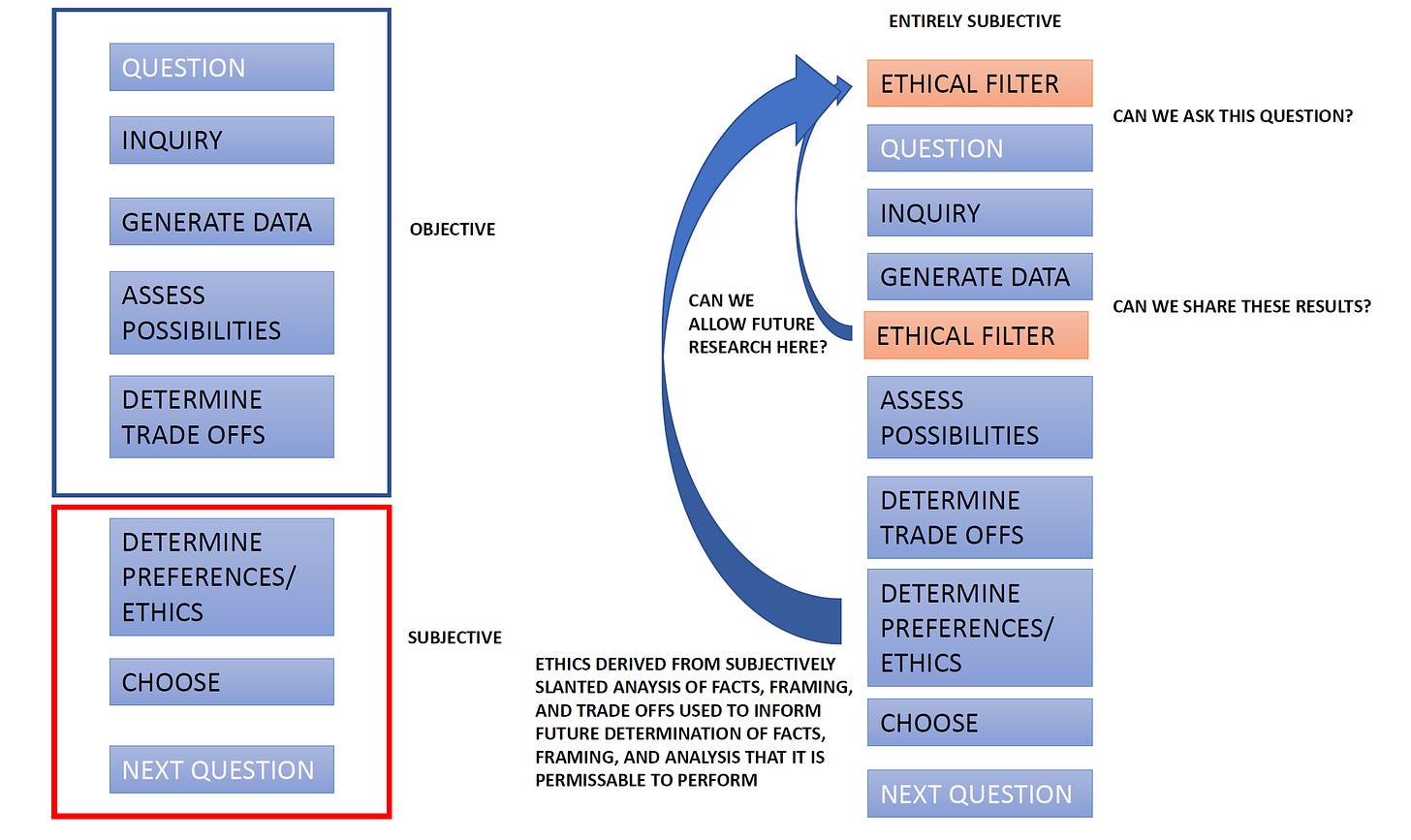


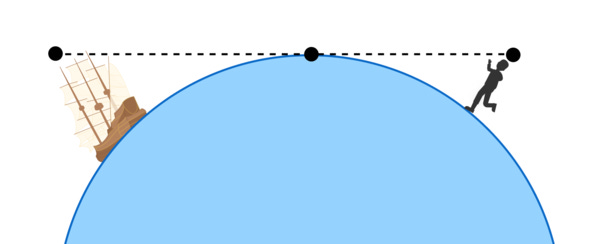



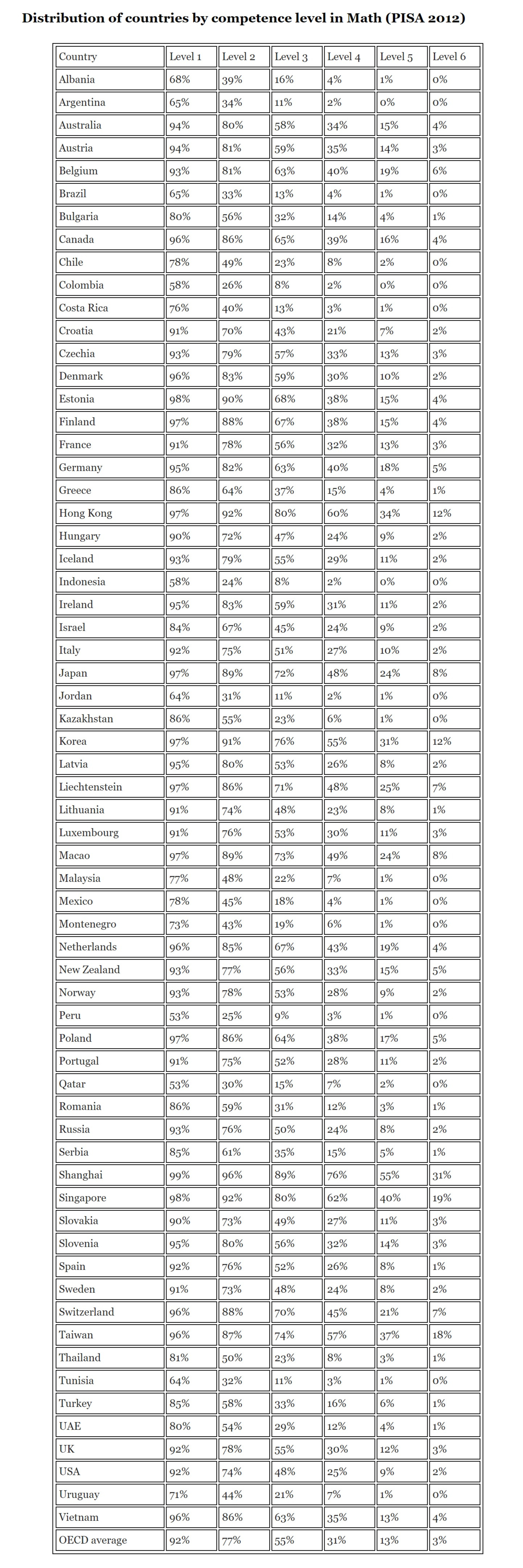
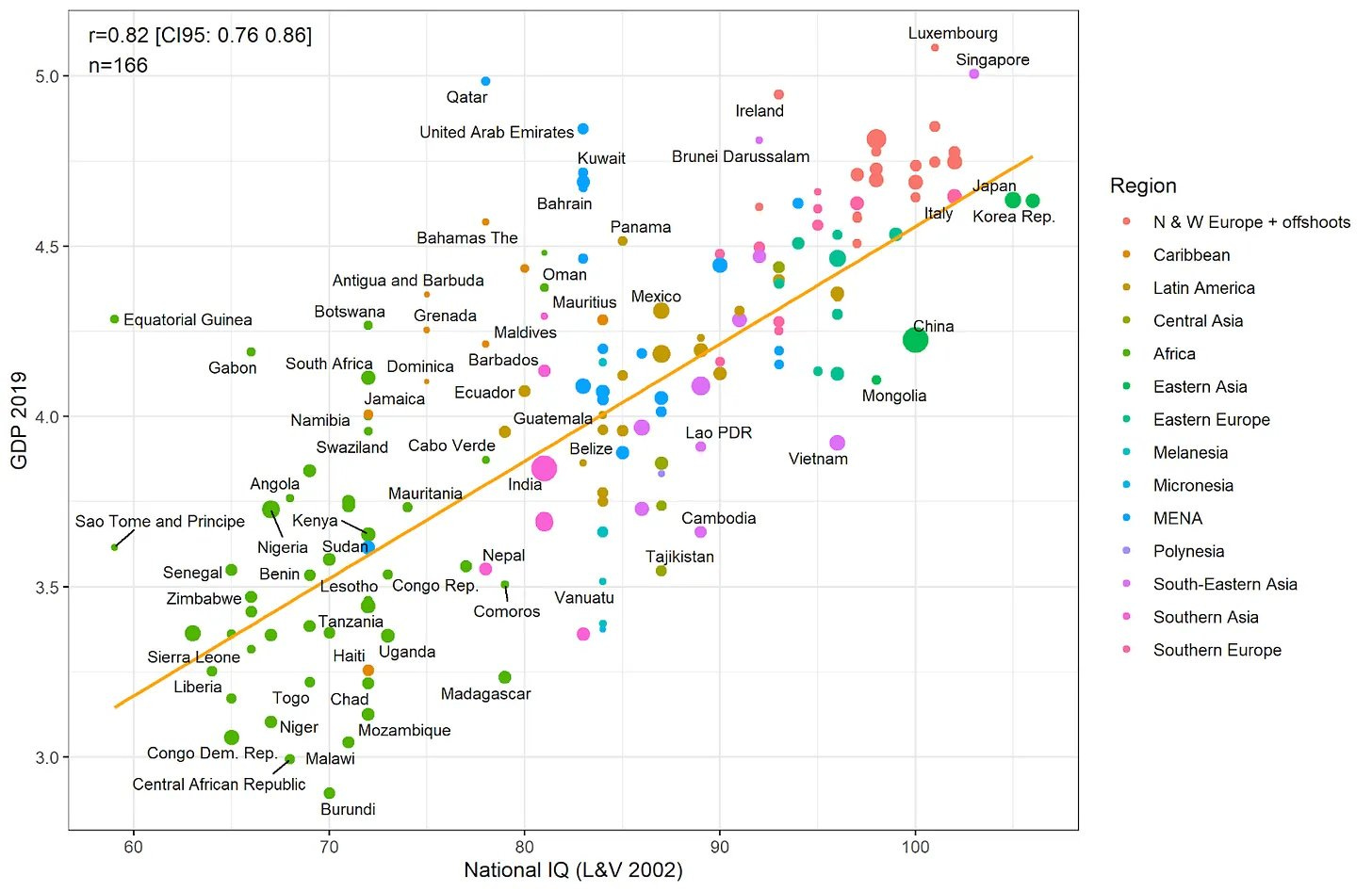


People are afraid of the truth. They always have been but now we have gone full circle back to the Middle Ages when the truth could be controlled and thereby avoided. In the 18th and 19th Century truth arrived with full force. If you got sick you died, if you didn't work you starved. If you were born a man or a woman you stayed that way. Not now.
This is an important essay because it gets to the crux of what are, essentially, deliberate impediments to intellectual curiosity which represents an impediment to the development of knowledge and so human development and progress.
Actually, however, this is NOT a new phenomenon. I have always worked in the Private sector but by virtue of my work I have often interacted with senior academics who, over the years, have highlighted this as an issue in academia. That certain avenues of "research" are essentially closed because they are not "politically correct". The more recent Covid "thing" has provided ample further illustration of this phenomenon.
I find it most difficult to understand how intelligent, highly educated people can at their fundamental belief level, go along with this thinking. Yes, I understand the self-preservation aspect but there seems to be more than that going on. Like with Covid, there seems to be a macro psyop in operation which forces people to "take sides" perhaps out of "fear" and persuade themselves that "truth is lies"?
I have no political axe to grind as I regard myself as an Agorist and have no affiliation with either side of the same Red/Blue political coin, but I think any impartial observer can see the effects of such "intellectual thinking" impacting US society today. There comes a point where society must decide which road to take in the wood?